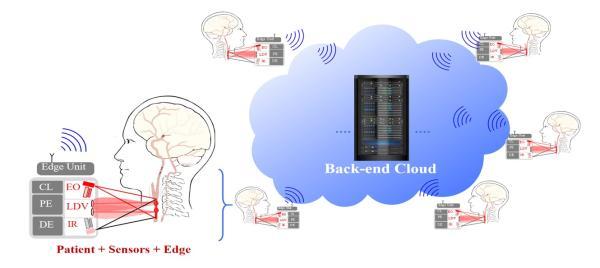A City College of New York-led project utilizing Artificial Intelligence and Machine Learning (AI/ML) technologies to develop a low-cost, easy-to-use, and high-precision system for the early diagnosis of cardiovascular disease is the recipient of a four-year $2.8 million National Science Foundation (NSF) grant. The Ohio State University-based, NSF-funded AI-EDGE Institute is partnering with The City College in the project entitled: “AI/ML-driven edge computing for cardiovascular disease diagnosis/mechanism study.”
“Heart disease is the leading cause of death in the United States, so early diagnosis is of critical importance,” said Jie Wei, professor of computer science in CCNY’s Grove School of Engineering, and the project’s principal investigator.
However, since conventional medical tests and monitoring techniques are typically very expensive and require qualified trained personnel, they are not practical for at-home use. This makes the need of an inexpensive, handy and highly accurate system imperative.
“This project will develop an innovative sensing and learning system for cardiovascular disease diagnosis, which takes measurements from subjects by light-weight and safe multimodal sensors,” said Wei. “It will analyze the data via cutting-edge AI and ML technologies, and monitor various cardiovascular parameters in real-time with personalized learning technologies for guaranteed accuracy.”
He added that the success of the proposed research will leverage the interdisciplinary expertise of CCNY and the AI-EDGE institute of Ohio State Univ. on AI/ML edge computing, multimodal deep learning, medical computing, and computing-enabled disease mechanism study.
The overarching goal is an easy and affordable system that will have a high impact on cardiovascular disease diagnosis and demonstrate the powerful applications of AI/ML and edge computing techniques in medical sensing, healthcare, and basic scientific research of underlying molecular mechanisms of diseases. Wei pointed out that the findings and expertise gained from the project will significantly facilitate the dissemination of applications of AI/ML-enabled edge computing and distributed learning to the healthcare.
“This project will also assist in community building in the neighborhood surrounding CCNY by improving outreach to under-represented minority communities. Further, the interdisciplinary nature of the project will provide valuable training opportunities to City College students from diverse groups with cutting-edge AI/ML techniques and their applications to the bio-medical domain,” said Rosemarie Wesson, CCNY’s associate provost for research.
CCNY student involvement in the project will range from undergraduates to post-doctorates.
Wei's co-principle investigators include faculty from both CCNY and Ohio State University:
- Bingmei Fu (Biomedical Engineering, Grove School);
- Nicholas Madamopoulos (Electrical Engineering, Grove School);
- Jun Yoshioka (CUNY School of Medicine at CCNY); and
- Yingbin Liang (Ohio State University).
Last Updated: 09/26/2023 14:08
